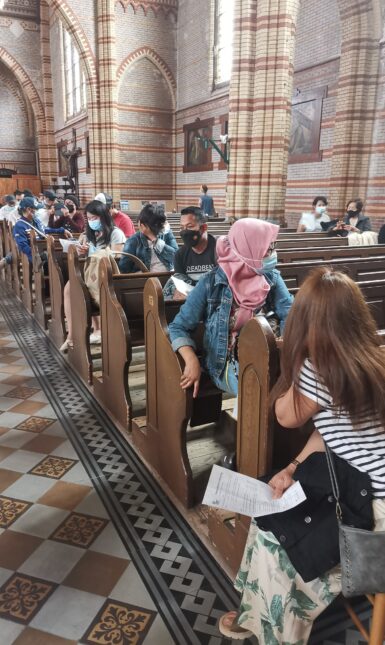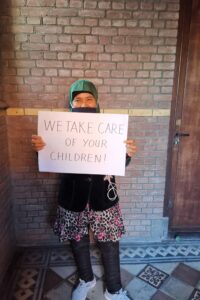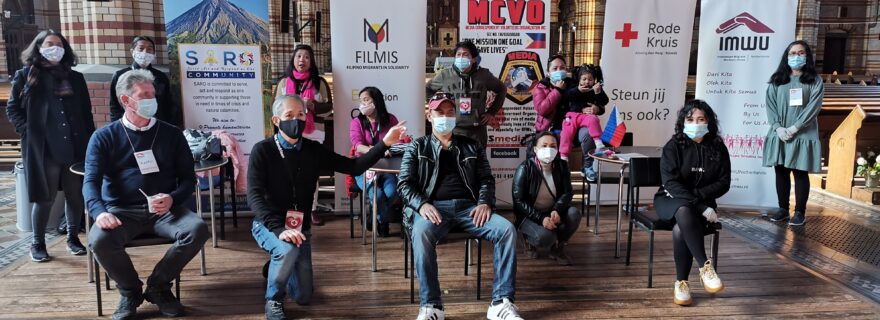The Shifting Meanings of “(Il)Legality”: Indonesian Migrant Workers in the Netherlands
How do migrants become ‘illegal’? How does their ‘illegality’ affect their position in the receiving countries? Ratna Saptari discusses the experiences of Indonesian migrants in the Netherlands and how they try to obtain recognition amidst shifting positions of (il)legality.
The Blurred Boundaries of Legality/Illegality
The migration of people due to displacement, war, or economic precarity has been a common phenomenon throughout history. In the receiving countries, these processes, on the one hand, conform to the needs of capital for cheap labour and the needs of private households for domestic labour. On the other hand, these processes collide with policies of receiving countries who attempt to safeguard their sovereignty through securitization of their borders.
The term ‘illegality’ has always been a source of contention and debate whether epistemologically or politically as it is often associated with the notion of criminality or lawlessness. For some, preference is given to the categories ‘undocumented’ or ‘irregular’ migrants, whereas others are more critical as these categories refer more to the condition of migrants not having the necessary documents either to reside or work in a particular country, yet ignore the social and political consequences of being in this condition. As Moors and de Regt have quite rightly pointed out, the categories legal/illegal should not be seen as a dichotomy but illustrate shifting positions that migrants may have during their migratory trajectory. This can clearly be seen in the case of migrants coming to the Netherlands through the mediation of formal or informal agents who offer all kinds of services to potential migrants. In this blogpost I build on five years of experience with IMWU-NL (the Indonesian Migrant Workers’ Union in the Netherlands) to illustrate how through all kinds of mediating agents migrants get to occupy these positions during their trajectory to – and in – the Netherlands.
Becoming ‘Illegal’
Many Indonesian migrant workers initially come to the Netherlands to work and earn an income, because of their precarious conditions at home. But it is through the migration process that they have often been brought into the grey area of being ‘illegal’. A clear example of this is a case that occurred in 2016, where three Indonesian women had paid an Indonesian recruitment agency large amounts of money. The agency promised to arrange their passports with proper visas and provide employment and housing the minute they arrived in the Netherlands. The passports of these three women were only given to them at the moment of departure in Jakarta, and their visas were transit visas which allowed them only a short stay of 18 days. Having paid such a large amount of money to the recruitment agency, receiving these passports was already a great relief for them. And having no experience with travelling abroad, they did not check what type of visa they had received. When they arrived at Schiphol airport nobody came to pick them up. Eventually after some hours, they managed to contact a friend who lived in Amsterdam who further helped them through other contacts to obtain a provisional roof over their heads. As I had contact with these women not long after their arrival, I saw that their permit was based on a Transit Visa, which was valid between 9 February 2016 to 18 February 2016. Within less than two weeks their visas had expired and by default they were overstayers and therefore became ‘illegal’ migrants. The money that they had paid to the agent they had obtained through loans from family members, which they were expected to pay back as soon as they had gotten a job. The wage that was promised to them was around 1500 euros a month. Upon arrival, they found out that nothing had been prepared for them.
The case of these three women reflects the situation of many of the ‘illegal’ migrants in Europe or in the Netherlands, where because of their urgent need for income to be able to meet their family’s daily needs, to take care of their family member’s medical condition; to allow their children to continue their education, or because of their displacement due to certain development projects involving land acquisition by (global) corporations, they end up in a precarious position of becoming ‘illegal’.

Borders and Governmentality
With the expansion of the external borders of the European Union control over who may enter through these borders has become increasingly complicated. I found out that Indonesian migrants frequently enter the Netherlands through Portugal, Belgium or Poland. This may be because the procedures to apply for a visa in the embassies of these countries are less rigid or that there are specific recruitment agencies that have contacts in these countries that provide the possibility for obtaining transit or tourist visas.
State attempts at controlling migration through detention or deportation, have been countered by humanitarian approaches which promote the recognition of international agreements such as the ILO Domestic Workers Convention 189 and the UN Convention on the Protection of the Rights of All Migrant Workers and Members of their Families. Although, these conventions have not been ratified by many European countries or migrant receiving countries, human rights activists use them as instruments in public campaigns to bring up the issue of the human rights of migrant workers.
Strategies of Survival and the Political Struggle for Recognition
Most of these migrant men and women who have regularly been duped by recruiters nevertheless manage ultimately to obtain some kind of informal work, either in cleaning and/or child-care (especially for the women) and construction work (especially for the men), through their personal networks in the Netherlands. Their position is by default precarious since they cannot obtain a residence permit or work permit. Cases of underpayment, or non-payment occur regularly and these migrants continuously fear being deported when there happens to be a security check. Living conditions are often problematic and insecure, as migrants regularly share one small room with 5 or 6 other people and risk being reported to the police. Especially during the Covid-19 crisis there have been various stories of non-payment, a drastic reduction in hours of work or a prohibition to enter the house of the employer. Those not wearing masks while bicycling to the place of work, or wearing it improperly while travelling by public transportation, have occasionally been stopped and questioned by security officials, in some cases resulting in deportation. Deportationoften means that these migrants will not be able to provide income for their family members or to pay the debts they had incurred in order to come to the Netherlands.

However, there are also more positive stories. For instance, during the Covid pandemic some employers requested migrants who clean their houses not to enter the house because of fear of infection, yet they still continued paying their wages. Social and religious institutions have provided material support to these migrants through their charitable activities. In the Hague for instance, the Red Cross has recently provided weekly supermarket vouchers of € 15 to Filmis (Filipino Migrants in Solidarity) and IMWU members among others, to help them through this period. Local churches and mosques have provided the space for these distributions to be held safely. Furthermore, IMWU collaborated with the GGD (Municipal Health Service) and the Red Cross to make possible the vaccination of hundreds IMWU members in Amsterdam, The Hague and Rotterdam.
Finally, migrant organizations and FNV, the Dutch trade union, have also been involved in the campaign for the ratification of ILO Convention 189 (for the protection of domestic workers) This campaign is currently being undertaken by various migrant organizations and human-rights based Dutch NGOs. On June 1, 2021, it was ten years already that this C189 came into effect within the ILO, but until now has not been ratified by the Dutch government.
How this campaign may help migrants struggle for their rights on a daily level, is still a big question, but nevertheless articulating the existence of such conventions at the national and regional level supports the everyday struggle of these migrants, allowing them some respect despite their ‘illegal’ position in the hope that this position will eventually shift towards state recognition and legality.



2 Comments
The concept of "legality" is often seen as a clear and straightforward definition, but it can have different meanings and interpretations in different contexts. This is especially true when it comes to the situation of Indonesian migrant workers in the Netherlands. When I lived in Netherland i never faced such situation but i always worried about my education, because i worked too much to live a happy life that's why I always preferred to take Proofreading Services -> https://thesiswritinghelp.com.pk/thesis-editing-and-proofreading-service/ but some of my friends faced this issue. My friend always discussed about this. Indonesian migrant workers in the Netherlands may face complex issues regarding their legal status, as their migration often takes place outside of formal channels. This can result in a situation where they are considered "illegal" by the Dutch authorities, even if they have been living and working in the country for many years.
Thanks for sharing these insights!
Add a comment